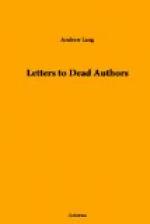XVII.
To Percy Bysshe Shelley.
Sir,—In your lifetime on earth you were not more than commonly curious as to what was said by ‘the herd of mankind,’ if I may quote your own phrase. It was that of one who loved his fellow-men, but did not in his less enthusiastic moments overestimate their virtues and their discretion. Removed so far away from our hubbub, and that world where, as you say, we ’pursue our serious folly as of old,’ you are, one may guess, but moderately concerned about the fate of your writings and your reputation. As to the first, you have somewhere said, in one of your letters, that the final judgment on your merits as a poet is in the hands of posterity, and that you fear the verdict will be ‘Guilty,’ and the sentence ‘Death.’ Such apprehensions cannot have been fixed or frequent in the mind of one whose genius burned always with a clearer and steadier flame to the last. The jury of which you spoke has met: a mixed jury and a merciful. The verdict is ‘Well done,’ and the sentence Immortality of Fame. There have been, there are, dissenters; yet probably they will be less and less heard as the years go on.
One judge, or juryman, has made up his mind that prose was your true province, and that your letters will outlive your lays. I know not whether it was the same or an equally well-inspired critic, who spoke of your most perfect lyrics (so Beau Brummell spoke of his ill-tied cravats) as ’a gallery of your failures.’ But the general voice does not echo these utterances of a too subtle intellect. At a famous University (not your own) once existed a band of men known as ‘The Trinity Sniffers.’ Perhaps the spirit of the sniffer may still inspire some of the jurors who from time to time make themselves heard in your case. The ‘Quarterly Review’, I fear, is still unreconciled. It regards your attempts as tainted by the spirit of ’The Liberal Movement in English Literature;’ and it is impossible, alas! to maintain with any success that you were a Throne and Altar Tory. At Oxford you are forgiven; and the old rooms where you let the oysters burn (was not your founder, King Alfred, once guilty of similar negligence?) are now shown to pious pilgrims.
But Conservatives, ’t is rumoured, are still averse to your opinions, and are believed to prefer to yours the works of the Reverend Mr. Keble, and, indeed, of the clergy in general. But, in spite of all this, your poems, like the affections of the true lovers in Theocritus, are still ’in the mouths of all, and chiefly on the lips of the young.’ It is in your lyrics that you live, and I do not mean that every one could pass an examination in the plot of “Prometheus Unbound” Talking of this piece, by the way, a Cambridge critic finds that it reveals in you a hankering after life in a cave—doubtless an unconsciously inherited memory from cave-man. Speaking of cave-man reminds me that you once spoke of deserting song for prose, and of producing a history of the moral, intellectual, and political elements in human society, which, we now agree, began, as Asia would fain have ended, in a cave.




